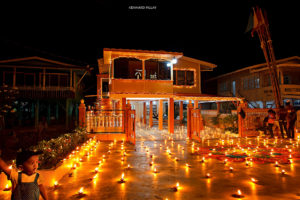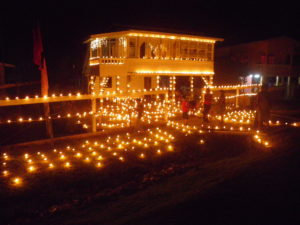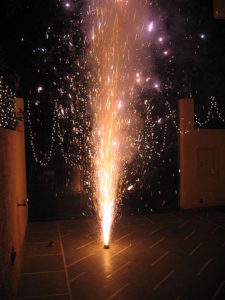 In the early days, we would see women with their brooms, buckets and cloths perched on ladders or tables stretching to reach every nook and cranny of their houses to ensure that it is cleaned to perfection, as they prepare for the arrival of Ma Lakshmi. It is believed that the goddess of wealth visits every home that is illuminated with little oil lamps on what is believed to be the darkest night of the year.
In the early days, we would see women with their brooms, buckets and cloths perched on ladders or tables stretching to reach every nook and cranny of their houses to ensure that it is cleaned to perfection, as they prepare for the arrival of Ma Lakshmi. It is believed that the goddess of wealth visits every home that is illuminated with little oil lamps on what is believed to be the darkest night of the year.
The festival of Diwali is one that is most-anticipated by the Hindu community, since it is a time for reflection and shining light on the darkness in their lives. It is a time when they are at their most forgiving and it signals the start of a lot of new things. In some cases, even new traditions.  According to the Bhagavad Gita, change is the law of the universe and we have indeed seen change as the only constant when it comes to how we celebrate the Festival of Lights. In the earlier days, there was a certain level of community when it comes to the celebration. Everyone would come together and chip in to make the celebration one that was for all.
According to the Bhagavad Gita, change is the law of the universe and we have indeed seen change as the only constant when it comes to how we celebrate the Festival of Lights. In the earlier days, there was a certain level of community when it comes to the celebration. Everyone would come together and chip in to make the celebration one that was for all.
As time changed so did society. Today, we see the disintegration of the level of community when it comes to certain aspects of Diwali. Back then, it was taboo to say that you are going to buy all your sweets and savoury snacks from a caterer or restaurant as opposed to labouring all day preparing them. Of course, back then, very few women had full-time jobs and those things were expected of them.

But as time progressed, expectations dropped and now, it is perfectly fine to have a caterer cater to the needs of you and your family.
Over the years, people have found their own reasons to make Diwali unique. Traditional celebrations would entail laborious cleaning of the house weeks in advance, lavish preparations including sweets and savouries, and the purchase of new clothes for the family. In the days gone by, people would do most things themselves, and little was left to purchase. Other than the clothes, ladies preferred completing all other arrangements at home. Sweets were prepared at home by the ladies, the cleaning was done with the help of the men, and the arrangements were made with the children. While we know Diwali as a time to greet everyone and share special moments, the build-up to Diwali was special in the early days. Men would gather together weeks in advance

to find ways to make Diwali special. Ladies would work together to make sweets and food, making this truly a community
occasion.
The Hindu community, particularly, has changed the way in which they celebrate Diwali now. There was a time when the only lights that illuminated the yards and homes of Hindus were those of the little earthen lamps
powered by coconut oil or ghee. But now the scenes are different with houses elaborately wrapped in fairy lights twinkling away without the threat of being doused by the wind. We are seeing fewer diyas being lighted to illuminate the pathways and more ornamental lighting taking centre stage.
Also, one of the biggest changes, in the Guyanese context, is the virtual disappearance of the little mud diyas that were usually made on Deepavali day or the day before and left in the sun to bake.
They are hard to find in homes since it is much easier to pick up some clay diyas from the supermarket.
Despite all the changes, Diwali still remains relevant in today’s society, because it fosters unbreakable bonds and reignite the camaraderie and togetherness in us. So go out there and light a diya, despite your religious beliefs, and illuminate your heart so there is space for more people in it.



